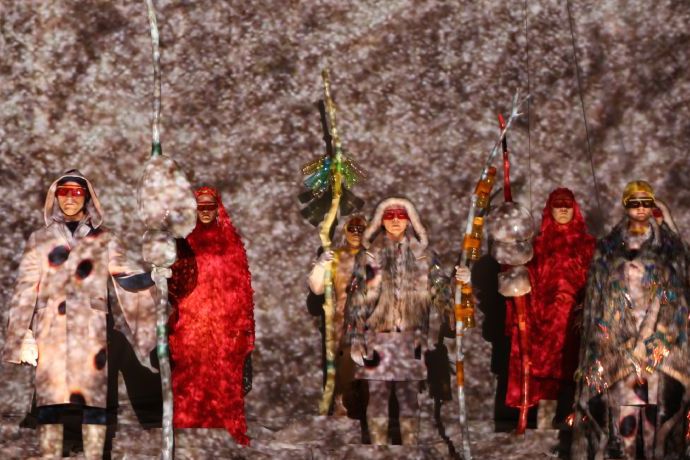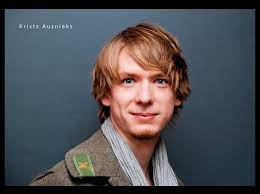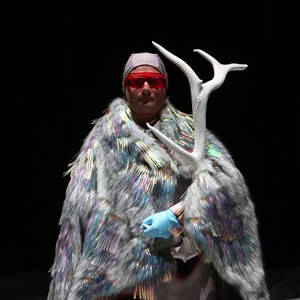
By Daniel Shkolnik
The world has ended. Of humanity’s billions, only twelve remain. They stand together and sing, punished by the hurricanes, dust storms, and ineffable loneliness of a world devastated by climate change. Welcome to the eco-apocalyptic opera NeoArctic.
Recently nominated for Performance of the Year at Latvia’s Grand Music Awards, NeoArctic will make its next portentous performance on June 24th at the Arctic Arts Festival in Harstad, Norway. Audience members can expect a one-and-a-half-hour trip to an abstract vision of Earth, desolated by the onset of the Anthropocene—the current geological age in which humans have become a dominant influence on the Earth’s environment.
The evocative libretto was produced for Hotel Pro Forma and the Latvian Radio Choir by award-winning Icelandic writer (and Björk’s lyricist) Sjón and set to music by techno artist Andy Stott and Latvian-born composer Krists Auznieks. Directed by Kirsten Dehlholm, the opera’s suite of twelve ‘songs’ evoke a post-apocalyptic world where climate change has turned the Earth into a hostile planet, a place where the seas is covered in plastic, where the ground is poisoned with “fluorescent” minerals, and where dust sweeps across abandoned battleships and the skulls of elephants.
What the naïve, uninstructed, childlike, or illusion-ridden viewer accepts as ‘real’ a more knowledgeable and emancipated one sees to be a carefully planned show
The core inspiration for NeoArctic was a three-volume work called Textures of the Anthropocene. The triad consists of a compilation of texts produced over several centuries by scientists, artists, and theorists, which together track the human race’s emerging awareness of the Anthropocene. But as pivotal as Textures of the Anthropocene is to the opera, NeoArctic in a sense isn’t really about the Anthropocene. Rather it’s about the era that comes immediately after it: when humans—on the brink of extinction—no longer influence nature but are again powerless before it.
Perhaps it is no coincidence NeoArctic’s post-historic world feels curiously pre-historic. The singers’ clothing appears to be inspired by ancient tribal garb. They sometimes wear Eskimo-style snow goggles and carry shaman-like staffs painted in man-made colors and affixed with clusters of plastic bottles. Like early hunter gatherers, the characters of NeoArctic constantly wander the various landscapes of the Earth, a displaced people.
Brought to heel, these last humans—much like our ancestors—seem to have a profound reverence for nature. The characters of the opera retain a monastic manner and often sing in Gregorian chant. Several wear hoods and all move across the stage at a penitent’s pace, if they move at all. They seem to relate to their world with a mix of cosmic sadness, Old Testament fear, and stoic awe. The opera’s vision of human history is palindromic. We end much like we began: tribal, nomadic bipeds struggling to understand a world over which we have little control.

Composer Krists Auznieks
NeoArctic exists far outside the Italian operatic tradition but close to the musical and global climate of our time. Electronic music including techno feature heavily throughout the opera, and the backdrop for every song is an abstract, digital-made landscape projected onto and behind the singers. The minimalism of Philip Glass is also potent in the piece, which is redolent of both Koyaanisqatsi: Life Out of Balance and his opera Einstein on the Beach which Auznieks says was very much on his mind as he composed for NeoArctic.
If it had to be given a genre, this opera could be labeled a tragedy, albeit a still one. No one dies onstage—though presumably everyone will. There are no betrayals or great reveals. No heroes are undone by their flaws. The characters are never differentiated by names or varied personalities. In fact, calling them ‘characters’ at all might be a stretch. But through this theatrical austerity the tragedy of global loss is impressed upon the audience with a quiet and persistent pressure. The tragic fall of NeoArctic is humanity itself, and the catharsis comes from watching the very extinction of the human race.
Forbidding as this opera may be, in my interview with Auznieks optimism was high. Like most humans, he isn’t a big fan of the post-human idea. ‘I’m an optimist,’ he says. ‘I somehow believe we’ll find a way to solve all of this.’
He sees the Paris Agreement as an inkling that humanity is capable of that kind of intelligence, but claims artists themselves also have a role to play. ‘If a hundred years ago what was at stake [in concert music] was aesthetics,’ Auznieks says, ‘then now it’s the very existence of the human race.

‘To say that I can transform the mind through music alone is far-fetched, though that’s of course my ideal hope. … If humans turn out to be a geological force, and art can affect humans, then what I hope for is that art becomes a geological force.’
Auznieks is cautious about claiming that NeoArctic provides any kind of window into the future. If he had to guess, to future audiences ‘[NeoArctic] will probably seem incredibly naïve.’ The opera, although based in scientific research, is an abstract extrapolation of what a worst-case scenario might look like. What the real future holds has yet to be decided.
Quoting Northrop Frye, he says: ‘What the naïve, uninstructed, childlike, or illusion-ridden viewer accepts as ‘real’ a more knowledgeable and emancipated one sees to be a carefully planned show, and planned within the framework of a . . . convention.’
‘Things are the way they are because we have all agreed on their state. Not only have we agreed to live in the kind of societies in which we are living, but we have also agreed that the houses will look like this and the cities like that. We have agreed that capitalistic gains are going to motivate our decision making. We have agreed on even larger things than that. I want us all to ponder the power of that awareness and how much power we’d have if we disagreed and instead chose to agree with something else.’ ![]()
NeoArctic will be performed on June 24th at the Arctic Arts Festival in Harstad, Norway. festspillnn.no/en